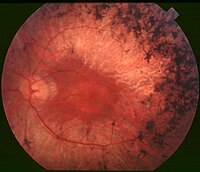
Photo from wikipedia
ABSTRACT Corneal dystrophies represent a group of heterogeneous hereditary disorders causing progressive corneal opacification and blindness. Current corneal transplant management for corneal dystrophies faces the challenges of repeated treatments, complex… Click to show full abstract
ABSTRACT Corneal dystrophies represent a group of heterogeneous hereditary disorders causing progressive corneal opacification and blindness. Current corneal transplant management for corneal dystrophies faces the challenges of repeated treatments, complex surgical procedures, shortage of appropriate donor cornea, and, more importantly, graft rejection. Genetic medicine could be an alternative treatment regime to overcome such challenges. Cornea carries promising scope for a gene-based therapy involving gene supplementation, gene silencing, and gene editing in both ex vivo and in vivo platforms. In the cornea, ex vivo gene therapeutic strategies were attempted for corneal graft survival, and in vivo gene augmentation therapies aimed to prevent herpes stromal keratitis, neovascularization, corneal clouding, and wound healing. However, none of these studies followed a clinical trial-based successful outcome. CRISPR/Cas system offers a broad scope of gene editing and engineering to correct underlying genetic causes in corneal dystrophies. Corneal tissue--specific gene correction in vitro with minimal off-target effects and optimal gene correction efficiency followed by their successful surgical implantation, or in vivo CRISPR administration targeting pathogenic genes finds a way to explore therapeutic intervention for corneal dystrophies. However, there are many limitations associated with such CRISPR-based corneal treatment management. This review will look into the development of corneal gene therapy and CRISPR-based study in corneal dystrophies, associated challenges, potential approaches, and future directions.
Journal Title: Asia-Pacific journal of ophthalmology
Year Published: 2022
Link to full text (if available)
Share on Social Media: Sign Up to like & get
recommendations!